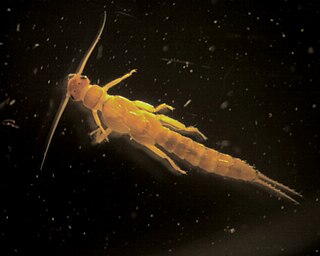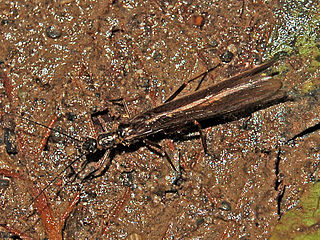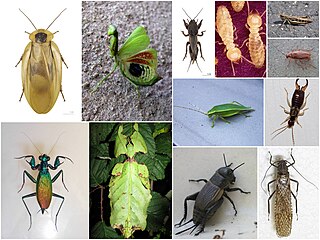
Taeniopterygidae are a family of stone flies with about 110 described extant species. They are commonly called willowflies or winter stoneflies and have a holarctic distribution. Adults are usually smaller than 15 mm.

The Perlodidae, also known as the perlodid stoneflies, stripetails, or springflies, are a family of stoneflies.

The Perlidae are a family of stoneflies, with more than 50 genera and 1,100 described species. The majority of the Perlidae are found in eastern North America, but they occur worldwide except for Antarctica and parts of Africa. Their lifecycles range between one and three years. The adults emerge in the summer; they are very active and known to be attracted to light sources. They are usually very sensitive to changes in environment.

The Capniidae, the small winter stoneflies, are a family of insects in the stonefly order (Plecoptera). It constitutes one of the largest stonefly families, containing some 300 species distributed throughout the holarctic. Their closest relatives are the rolled-winged stoneflies (Leuctridae).

Arctoperlaria is a suborder of stoneflies, with a World-wide distribution. The Plecoptera Species File divides this suborder as follows:

Chloroperlidae are a family of stoneflies, commonly known as green stoneflies, with more than 200 species and 22 genera. They appear green to yellow in colour, and are popularly used among fisherman as bait for trout fishing. Green stoneflies live in the benthic zone of the cold streams and rivers of five continents and four zoogeographical regions, emerging from the water to live in the riparian zone as adults. They are sensitive to pollutants, making them an indicator species for determining the quality of water bodies. Chloroperlidae are hemimetabolous, having no pupal stage, but instead hatch from eggs as nymphs and mature directly into adults. They are omnivorous, feeding on small organisms and plant particles, and become more carnivorous as they mature. The classification of Chloroperlidae is contested, with some believing that they should be considered as members of different orders, as opposed to the order Plecoptera that they currently belong to.

Mesoraphidiidae is an extinct family of snakeflies in the suborder Raphidiomorpha. The family lived from the Late Jurassic through the Late Cretaceous and is known from twenty-five genera. Mesoraphidiids have been found as both compression fossils and as inclusions in amber. The family was first proposed in 1925 by the Russian paleoentomologist Andrey Vasilyevich Martynov based on Upper Jurassic fossils recovered in Kazakhstan. The family was expanded in 2002 by the synonymizing of several other proposed snakefly families. The family was divided into three subfamilies and one tribe in a 2011 paper, further clarifying the relationships of the included genera.

The Leuctridae are a family of stoneflies. They are known commonly as rolled-winged stoneflies and needleflies. This family contains at least 390 species.

Siphlonuridae, also known as the primitive minnow mayfly is a family of insects belonging to the order Ephemeroptera. They are adapted to cool waters.

Eustheniidae is a family of insects in the order Plecoptera, the stoneflies. They are native to Australia, New Zealand, and Chile.
Ametropodidae is a family of mayflies in the order Ephemeroptera. There are at least three genera and three described species in Ametropodidae.

The cohort Polyneoptera is one of the major groups of winged insects, comprising the Orthoptera and all other neopteran insects believed to be more closely related to Orthoptera than to any other insect orders. They were formerly grouped together with the Palaeoptera and Paraneoptera as the Hemimetabola or Exopterygota on the grounds that they have no pupa, the wings gradually developing externally throughout the nymphal stages. Many members of the group have leathery forewings (tegmina) and hindwings with an enlarged anal field (vannus).

Kathroperla is a genus of green stoneflies in the family Chloroperlidae. There are at least four described species in Kathroperla.

Capnia is a genus of small winter stoneflies in the family Capniidae. There are at least 120 described species in Capnia.

Austroperlidae is a family of stoneflies in the order Plecoptera. There are about 10 genera and 15 described species in Austroperlidae across southern land masses Australia, New Zealand, and South America.Austroperlidae species are unique among stoneflies in having aposematic (warning) colouration. For instance, the New Zealand black stonefly Austroperla is a forest dwelling shredder that is toxic to predators due to its production of hydrogen cyanide. The warning colouration of this species is mimicked by several lineages of the unrelated non-toxic New Zealand stonefly Zelandoperla.

Diamphipnoidae is a family of stoneflies in the order Plecoptera. There are at least two genera and about nine described species in Diamphipnoidae. They are only found in Chile and Argentina, and possibly Paraguay and Uruguay.

Gripopterygidae is a family of stoneflies in the order Plecoptera. There are more than 50 genera and 320 described species in Gripopterygidae.
Notonemouridae is a family of stoneflies in the order Plecoptera. There are more than 20 genera and at least 120 described species in Notonemouridae.
Styloperlidae is a family of stoneflies in the order Plecoptera. There are at least 2 genera and 9 described species in Styloperlidae. The species etymology is based on the type of locality near Sapa.
2018 in paleoentomology is a list of new fossil insect taxa that were described during the year 2018, as well as other significant discoveries and events related to paleoentomology that were scheduled to occur during the year.















